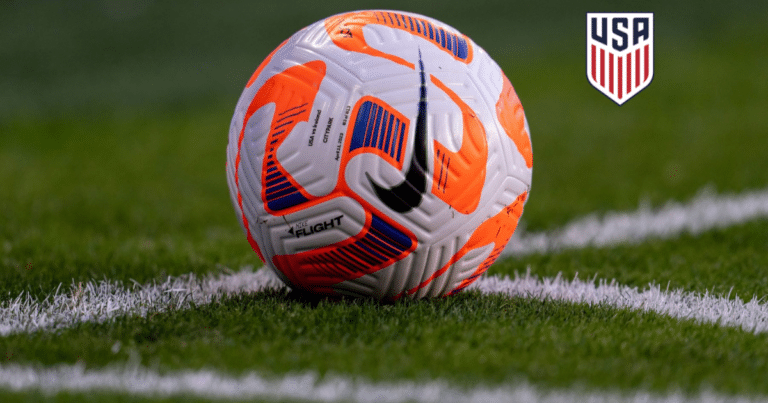About the United States Women’s National Soccer Team
The United States women’s national soccer team (USWNT) is one of the most exciting and successful teams in international women’s soccer.
Collectively, they have won four Women’s World Cup titles, four Olympic gold medals, and nine CONCACAF Gold Cups.
The team has been dominant in recent years, winning the 2015 and 2019 Women’s World Cups and the 2012 and 2016 Olympic gold medals.
In this article, we’ll explain what makes them so good and special. Will the rest of the world catch up? Or, will they continue to dominate international play?
History of the USWNT
Early Years
The United States women’s national soccer team began in 1985, playing their first match that year.
They quickly established themselves as a dominant force in international women’s soccer, winning the first-ever Women’s World Cup in 1991.
The team continued to make strides in the years that followed, with talented players like Michelle Akers and Mia Hamm leading the way.
1999 Women’s World Cup
One of the most significant moments in the history of the USWNT came in 1999, when they hosted and won the Women’s World Cup.
The tournament was a turning point for women’s soccer in the United States, drawing record crowds and capturing the attention of the nation.
The team’s victory in the final, which was decided by a penalty shootout, is still remembered as one of the most iconic moments in American sports history.
If you’re too young to remember, here is a clip…
Stars and Stripes
Over the years, the USWNT has been home to many talented players, including Kristine Lilly, Abby Wambach, and Mia Hamm.
These elite players and others have helped cement the team’s legacy as one of the most successful in international soccer.
The team’s iconic kits, featuring the stars and stripes of the American flag, have become synonymous with the USWNT’s winning spirit and patriotic pride.
500th Win
In 2019, the USWNT achieved another milestone when they won their 500th match in team history.
The victory came in a friendly against Portugal, with the team winning by a score of 4-0. The achievement was a testament to the team’s sustained excellence over the years, and a reminder of their status as one of the greatest teams in the history of women’s soccer.
USWNT Achievements
The United States women’s national soccer team has won several prestigious titles and championships over the years.
 FIFA Women’s World Cup
FIFA Women’s World Cup
The USWNT has won the FIFA Women’s World Cup a total of four times, in 1991, 1999, 2015, and 2019.
They have also finished as runners-up once, in 2011. The team’s most recent victory in 2019 was particularly impressive, as they won all seven of their matches and scored a total of 26 goals, while conceding just three. That’s just amazing!
What about the United States Men’s National Team? Meh…we won’t talk about that (yet).
Olympic Gold Medals
The USWNT has won four Olympic gold medals, in 1996, 2004, 2008, and 2012. They have also won a silver medal in 2000 and a bronze medal in 2021. The team’s success at the Olympics is a testament to their consistent excellence over the years.
CONCACAF Women’s Championship
The USWNT has won the Concacaf Women’s Championship a total of nine times, in 1991, 1993, 1994, 2000, 2002, 2006, 2010, 2014, and 2018. The team has dominated the tournament, winning it every time they have participated.
Canada, Mexico, and Costa Rica are the other strong teams in the competition.
About CONCACAF: CONCACAF women’s soccer is an association football competition organized by the Confederation of North, Central American, and Caribbean Association Football (CONCACAF) for women’s national teams in the region. It includes several tournaments, such as the CONCACAF W Championship, the Women’s Gold Cup, and the Women’s World Cup Qualifying. These competitions provide opportunities for teams to compete and qualify for major international tournaments, such as the FIFA Women’s World Cup and the Olympic Games.
Algarve Cup
The USWNT has won the Algarve Cup a total of ten times, in 2000, 2003, 2004, 2005, 2007, 2008, 2010, 2011, 2013, and 2015. The tournament is held annually in Portugal and is considered to be one of the most prestigious women’s soccer tournaments in the world.
Overall, the USWNT’s achievements speak for themselves. They have consistently been one of the best teams in the world and have won numerous titles and championships. The team’s success is a testament to their hard work, dedication, and talent.
Key Players and Coaching Staff
Becky Sauerbrunn
Becky Sauerbrunn is a center-back who has been a key player for the USWNT since 2008. She is known for her strong defensive skills and leadership on the field. Sauerbrunn has won two World Cup titles and an Olympic gold medal with the USWNT.
Carla Overbeck
Carla Overbeck is a former USWNT defender who played for the team from 1988 to 2000. She was the captain of the USWNT during the 1999 World Cup, which the team won. Overbeck was known for her strong defensive skills and leadership on the field.
Heather O’Reilly
Heather O’Reilly is a former USWNT midfielder who played for the team from 2002 to 2016. She won three Olympic gold medals and a World Cup title with the USWNT. O’Reilly was known for her speed and ability to create scoring opportunities for her teammates.
Saskia Webber
Saskia Webber is a former USWNT goalkeeper who played for the team from 1998 to 2000. She was a backup goalkeeper during the 1999 World Cup, which the USWNT won. Webber was known for her strong goalkeeping skills and leadership on the field.
Carli Lloyd
Carli Lloyd is a midfielder who has been a key player for the USWNT since 2005. She is known for her ability to score goals in important moments, including scoring the game-winning goals in both the 2008 and 2012 Olympic gold medal matches. Lloyd has won two World Cup titles and two Olympic gold medals with the USWNT.
Mia Hamm
Mia Hamm is a former USWNT forward who played for the team from 1987 to 2004. She is considered one of the greatest soccer players of all time, and was known for her speed, skill, and ability to score goals. Hamm won two World Cup titles and two Olympic gold medals with the USWNT.
Alex Morgan
Alex Morgan is a forward who has been a key player for the USWNT since 2010. She is known for her speed, skill, and ability to score goals. Morgan has won a World Cup title and an Olympic gold medal with the USWNT.
Megan Rapinoe
Megan Rapinoe is a midfielder who has been a key player for the USWNT since 2006. She is known for her skill on the ball, ability to create scoring opportunities for her teammates, and her outspoken activism off the field. Rapinoe has won two World Cup titles and an Olympic gold medal with the USWNT.
The USWNT has had a number of talented coaches throughout its history. Some of the most notable include Jill Ellis, who led the team to two World Cup titles in 2015 and 2019, and Tony DiCicco, who coached the team to its first-ever World Cup title in 1991.
Currently, Vlatko Andonovski serves as the head coach of the USWNT. Andonovski has been with the team since 2019 and has already led them to a number of impressive victories.
Women’s Soccer in the US
Title IX
Title IX, a federal law passed in 1972, prohibits sex discrimination in education programs that receive federal funding.
This law has played a significant role in the development of women’s soccer in the US by requiring schools to provide equal opportunities for female athletes.
As a result, women’s soccer has become a popular sport at the collegiate level, with many talented players going on to play professionally.
Women’s Professional Soccer
Women’s Professional Soccer (WPS) was a professional soccer league in the US that operated from 2009 to 2012.
The league was founded in response to the success of the US Women’s National Team and the growing popularity of women’s soccer in the country.
However, due to financial difficulties, the league was forced to suspend operations after its third season.
National Women’s Soccer League
The National Women’s Soccer League (NWSL) was founded in 2012 as a successor to Women’s Professional Soccer.
The league is composed of 12 teams and is the top professional women’s soccer league in the US. The NWSL has seen steady growth in popularity since its inception and has attracted many talented players from around the world.
US Soccer Federation
The US Soccer Federation (USSF) is the governing body for soccer in the US. The federation oversees soccer development at all levels, including the national teams, professional leagues, and youth programs.
The USSF has played a significant role in the growth of women’s soccer in the US, providing support and resources to help develop the sport.
Overall, women’s soccer in the US has come a long way since the passage of Title IX in 1972. The development of professional leagues like the National Women’s Soccer League, along with the support of the US Soccer Federation, has helped to make the sport more accessible and popular than ever before.
Today, there are many talented female soccer players being produced from Girls Academy, ECNL and other top-notch youth leagues across the country.
USWNT in the Sporting World
Impact on Women’s Soccer
The USWNT has been a dominant force in women’s soccer for decades, winning four World Cup titles and four Olympic gold medals. Their success on the field has not only inspired a generation of young female athletes, but it has also helped to elevate the profile of women’s soccer around the world.
In recent years, the USWNT has been at the forefront of the fight for gender equality in sports. They have been vocal about the pay gap between male and female athletes, and their efforts have helped to bring about changes in the way that female athletes are compensated.
Collective Bargaining Agreement
In 2017, the USWNT signed a new collective bargaining agreement with the U.S. Soccer Federation. The agreement included significant improvements in pay and working conditions for the players, including increased salaries, better travel accommodations, and improved medical and training support.
The new agreement was a major victory for the USWNT, and it helped to set a new standard for female athletes in the United States and around the world. It also helped to solidify the team’s position as one of the most influential and powerful organizations in women’s sports.
Sports Illustrated Cover
 In 2019, the USWNT made history when they became the first women’s sports team to be featured on the cover of Sports Illustrated’s annual “Sportsman of the Year” issue. The cover featured star forward Megan Rapinoe, who had become a vocal advocate for gender equality and social justice during the team’s run to the World Cup title.
In 2019, the USWNT made history when they became the first women’s sports team to be featured on the cover of Sports Illustrated’s annual “Sportsman of the Year” issue. The cover featured star forward Megan Rapinoe, who had become a vocal advocate for gender equality and social justice during the team’s run to the World Cup title.
The Sports Illustrated cover was a powerful symbol of the USWNT’s impact on the sporting world, and it helped to raise awareness about the team’s efforts to promote gender equality and social justice. It also helped to inspire a new generation of young female athletes who saw themselves represented on the cover of one of the most iconic sports magazines in the world.
Conclusion
There is absolutely no doubt that the United States Women’s National Soccer Team has achieved remarkable success on the international stage, winning four Women’s World Cup titles and four Olympic gold medals, among other accolades.
The women’s team representing our country has proved that loyalty, dedication and inspiration are ingredients for success.
As the team continues to compete and make history, it serves as a reminder of the importance of women’s sports and the power of teamwork.
We love that players such as Alex Morgan have introduced and inspired so many young female soccer players across the globe.
The United States Women’s National Soccer Team is a shining example of excellence in women’s soccer and a source of inspiration for generations to come.

Written By: SoccerNovo
SoccerNovo is an independent youth soccer media brand built to help parents, players, and coaches better understand the game and the pathways available in U.S. soccer. Our mission is to make youth soccer simpler, clearer, and more accessible for everyone involved in it.
Let’s connect




